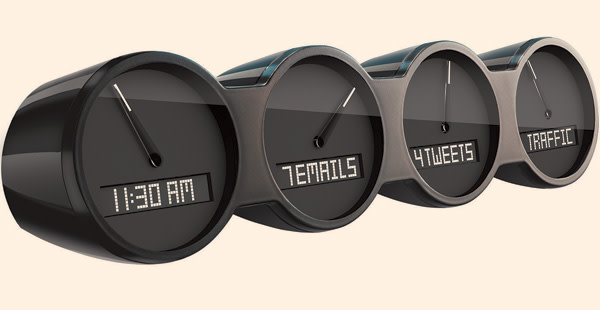Connected home: Quirky Nimbus clock reinvents the ordinary

Roula Khalaf, Editor of the FT, selects her favourite stories in this weekly newsletter.
Now that most of us check the time with a quick glance at our mobile phone, the ordinary, single-function household clock is at risk of becoming an endangered species. But not if Quirky, the crowdsourcing invention company, has anything to say about it. Enter Nimbus.
Nimbus, which resembles a digital dashboard, is a four-dial desktop device that displays the time but also tracks other data. Connected to a user’s phone via a Quirky app, the clock can monitor and display digitally available information such as weather, traffic, unread emails, Facebook likes, Twitter mentions, sports scores and share prices.
Ryan Pendleton, inventor of the Nimbus, says he had the “aha moment” in 2012, when his clock radio broke. “I commute an hour for work and live in a place where it snows,” he explains. “I realised I wanted something that combined when I have a meeting [in my calendar], with weather and traffic to tell me what time to leave in the morning.”
Mr Pendleton, who manages IT for a public school system in the US Midwest, tried to program his own mobile phone app. But he struggled to overcome unanticipated hurdles, such as the alarm clock not sounding on a phone drained of its battery.
While searching e-commerce sites during development of the product, Mr Pendleton came across tech-friendly Quirky. In April 2013, the company decided to move forward with production of his “clock”, which hit stores last month.
Reinventing the ordinary seems to be the Quirky ethos. Its “hero product” is Pivot Power, a flexible power strip. It also manufactures an egg tray that monitors how many eggs are in the fridge along with their expiry dates. A rake becomes a tool that also mashes leaves into the rubbish bag. Barbecue skewers come with levers to slide food on to your plate.
Bret Kovacs, Quirky’s head of strategic partnerships, says of the Nimbus: “What we know as the clock has evolved. In a world with too much information, this provides some discipline. You can go on your phone and see 80 widgets but this monitors four things. I was using my phone as my alarm clock – my wife was sick of it so we made a conscious effort to remove our phones from the bedroom. I can still monitor what’s important.”
However, not everyone is a convert. “My first reaction is, ‘How ironic’,” says Shalini Misra, professor at the School of Public and International Affairs at Virginia Tech. “Technology is often marketed as innovation to solve our information overload problem, but actually exacerbates it. Whatever is not measured is considered not to be of value,” she says.
“Facebook ‘likes’ make what’s new [more] important than saying hello to your children. Further, we know from research on interruptions and disruptions that every fragment of information from digital sources adds to taxation of our working memory.”
The pros and cons of adding more ways to look at more data are widely argued by cognitive scientists. Tom Stafford, lecturer in psychology and cognitive science at the University of Sheffield, theorises that we are merely forgetful of information we know to be easily retrievable, but are able to remember where to locate the information again. In other words, data are not eating our brain.
And clocks may be only the first step towards digital homes, says David Sadigh, founder and chief executive of the Geneva-based Digital Luxury Group, the publisher of the World Watch Report. “We now have software that checks your sleep and tells your iPhone to match your cycle to the time you want to wake up,” he says.
He adds: “I just moved to a new house, and it took me two hours to understand the heating. What if this connected device can help me reduce energy use in my house because it tells me when to leave and saves me time and energy costs?”
Indeed, the Nimbus clock is part of a partnership Quirky has formed with the US conglomerate General Electric to target the connected home market.
Nimbus can tell the user what time to leave home, while Spotter, Quirky’s motion detector, is capable of triggering the Pivot Power Genius, turning the lights on and off. And if your plans don’t quite go like clockwork, the app allows you to turn power on and off in your home from anywhere in the world.
Comments